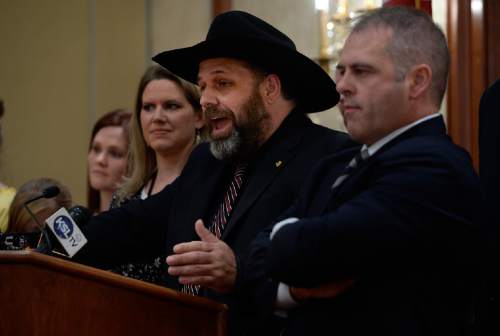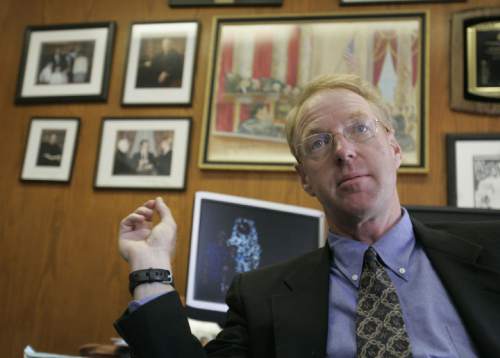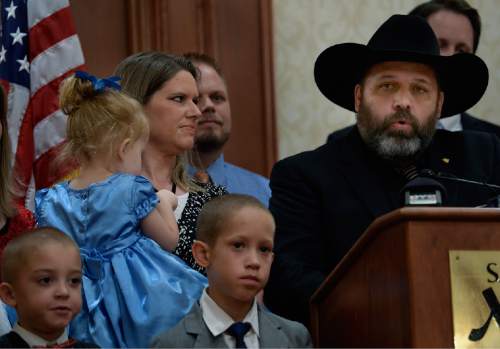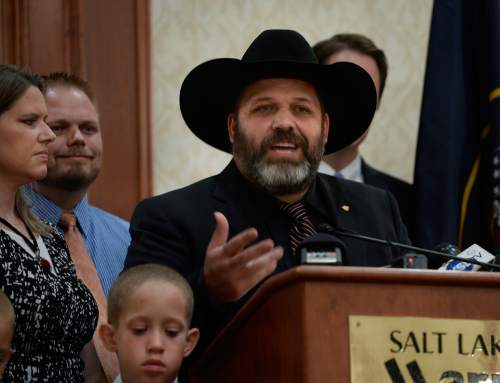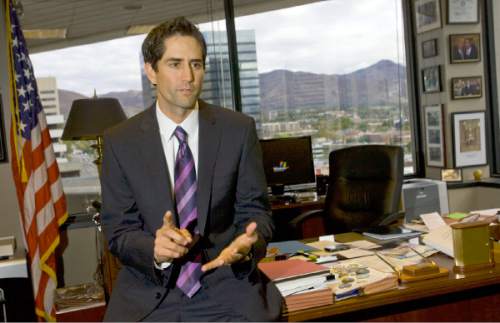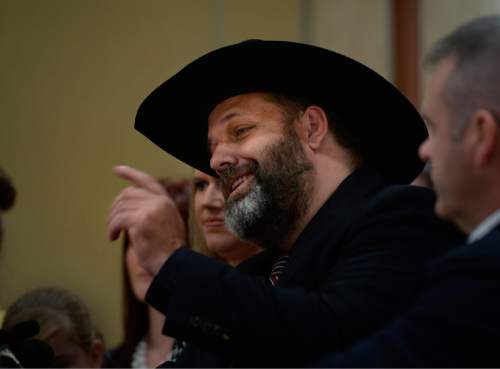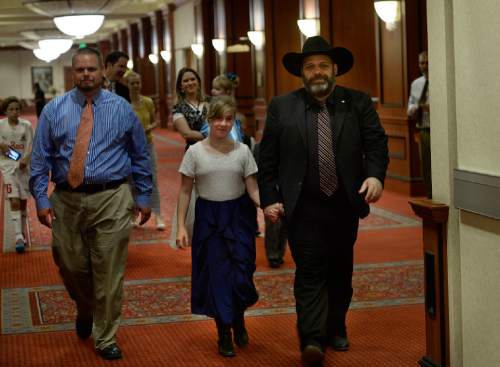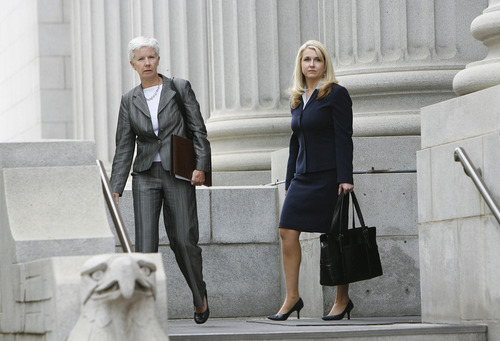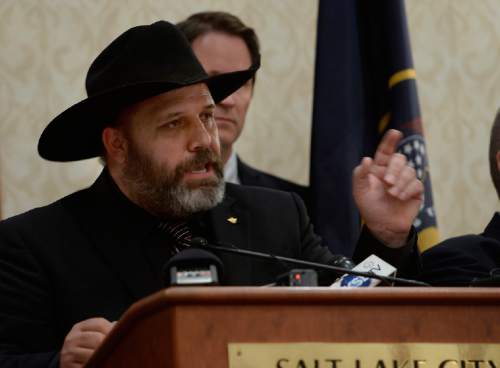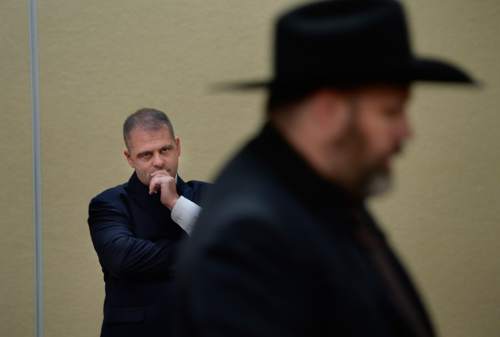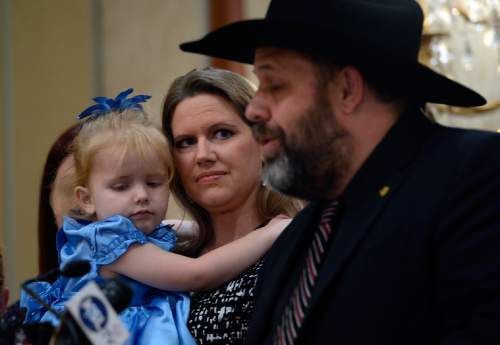This is an archived article that was published on sltrib.com in 2014, and information in the article may be outdated. It is provided only for personal research purposes and may not be reprinted.
Rick Koerber was back.
The day after a federal judge threw out the 18 criminal charges of fraud, money laundering and tax violations against him, Koerber showed up to crow at a downtown hotel wearing a black cowboy hat, and with six of his children, his wife and several friends in tow.
And crow he did. It was as if the old Rick Koerber had returned with all the bluster, bluff and vinegar of past times. He was the "Free Capitalist" of the radio show and billboards who enticed $100 million from investors for his special "Equity Milling" real-estate-investment program — the one before the federal indictments.
Now, on Aug. 15, Koerber stood before the cameras and unleashed on federal prosecutors.
The man accused of one of the biggest financial frauds in Utah history was free.
—
Money still gone • For people who consider themselves victims of Koerber, including those who lost their life savings, retirements and equity in their homes, the scene had to be disheartening. Not only was their money gone, but the man once accused of being chiefly responsible wouldn't face consequences.
Michael Kriester, of Connecticut, gave up two homes in Florida he invested in a Koerber company only to have it stop making promised payments. He pointed to repeated delays in the case and said that with the dismissal "I realized the government was falling apart."
But who's to blame?
For U.S. District Judge Clark Waddoups, there was one answer: Prosecutors in the U.S. attorney's office for Utah.
He chided them for a lackadaisical approach to the speedy trial requirements and for conduct that led him to dismiss the case with prejudice, meaning the charges cannot be refiled.
In a stinging rebuke, Waddoups said he agreed with the assessment of the case by Koerber's attorney, Marcus Mumford: "The violation of the Speedy Trial Act, in this instance, is another violation of law by federal prosecutors who, through the pattern and conduct of this case, have been strikingly unwilling to conform their own conduct to the Constitution, the applicable ethical standards, rules and statutes."
Paul Cassell, a University of Utah law professor and former federal judge, called Waddoups' description of prosecutors' conduct "an extraordinary kind of finding."
"Prosecutors win some and they lose some," said Cassell, himself a former Justice Department official and assistant U.S. attorney, "but rarely are they told they are losing because of a pattern of improper behavior."
Carlie Christensen, the acting U.S. attorney for Utah after the departure this summer of David Barlow, cautions that the case isn't over and her office is seeking permission from the Justice Department in Washington, D.C., to appeal.
"We consider this to be a still-open and active case," she said. "This is an appealable decision."
—
Delays, violations • Koerber was first indicted by a federal grand jury in May 2009 on mail and wire fraud charges after the case was referred to the U.S. attorney's office by Francine Giani, executive director of the Utah Department of Commerce.
Koerber was accused of running his companies, gathered under the umbrella of FranklinSquires Cos., as a Ponzi scheme in which he took in $100 million in loans and investments but then allegedly paid about half that amount to investors to make the operation appear profitable. Along the way, court documents say, he spent company monies on luxury cars, homes, adoptions and to get his teeth fixed, all allegedly contrary to what he had promised investors he'd do with their cash.
A second indictment, in November 2009, added 19 charges. But Mumford convinced Waddoups that a letter the government had relied on to charge Koerber with fraud was a confidential communication with his attorneys and could not be used as evidence.
That prompted a third indictment, in September 2011. Then, in 2012, Waddoups dismissed two of 20 charges, ruling part of the indictment was so vague that Koerber could not prepare to defend himself against them.
In August 2013, after rounds of arguments, counter-arguments and hearings to take testimony, the judge decided prosecutors could not use as evidence interviews federal agents had conducted with Koerber. Waddoups found the interviews violated Koerber's constitutional rights and rules of professional conduct when they took place without his lawyer present.
It was that background that Waddoups drew on in dismissing the case.
Almost always, attorneys say, violating the Speedy Trial Act — the federal law that ensures compliance with the Sixth Amendment clause — gets a case dismissed without prejudice, meaning the case could be taken back to a grand jury and a new indictment issued
"You don't typically see dismissals with prejudice," said former U.S. Attorney Brett Tolman who during his tenure decided to file the case against Koerber, "and I think the judge was going out of his way to make a statement on the case."
The dismissal comes in an atmosphere of collegiality that most often characterizes the small number of lawyers in Utah who practice in the area of white-collar crime, attorneys say.
Loren Washburn, a former federal prosecutor who's now a private attorney specializing in white-collar crime, said the defense is almost always the side that wants delays in the case, and it's been common in federal court for prosecutors and defense attorneys to take a somewhat-casual approach to the requirements of the Speedy Trial Act.
"Especially in Utah, there's what I'd call an easy truce on the Speedy Trial Act," said Washburn, meaning continuances are routinely agreed to by both sides.
Tolman called the ruling a "pretty good wake-up call" for prosecutors and defense attorneys.
—
"Very professional" • The lead Koerber prosecutor, Stewart Walz, is a veteran of white-collar crime cases dating back to the 1980s with a number of high-profile wins under his belt.
But his handling of the Koerber matter and its subsequent dismissal have led to questioning of how he conducted the case.
Giani reacted angrily to the dismissal, saying she likely would not refer any more cases to the U.S. attorney's office. She took a swipe at Walz and Waddoups.
On one hand, Giani wondered why a veteran prosecutor had been "out-maneuvered by committing malfeasance and being unable to count to 70." That number refers to how many days after an indictment is issued or a defendant first appears in court that a trial must commence.
On the other hand, Giani said she was "shocked and astounded at how easy it seems for Judge Waddoups to allow his personal dislike for one federal prosecutor to deny justice to so many victims."
While admitting prosecutors made mistakes, Christensen said, "I'm not aware of any antagonism in this case," and she praised Walz as a competent and respected prosecutor.
Washburn, who described Walz as a friend, pointed to technicalities in the law that complicate compliance for attorneys who may have as many as 20 or more cases to juggle.
"Anyone who's represented the government for very long — you just say, 'There but for the grace of God go I' when it comes to the Speedy Trial Act," he said.
J. Edward Jones, a Heber City attorney who recently represented a Koerber employee in a related fraud trial, said that while he found Walz's prosecution of that case "very professional," the jury acquitted his client because prosecutors' misjudged the evidence on whether his client had the intent to defraud when he gathered investment funds to place with Koerber's businesses.
—
Revolving door • In the wake of the dismissal, questions also have arisen about leadership in the Salt Lake City office of the U.S. attorney.
Some point to the revolving-door nature of U.S. attorney's offices, where posts are political and filled through interaction between the White House and members of Congress.
Typically, U.S. attorneys for Utah will stay in that job for about three years after the Senate approves their presidential nomination. They then use that public service as a career boost to return to private practice and much higher earnings.
That revolving door and gaps between confirmed U.S. attorneys can leave issues in the office unresolved, said Brent Baker, a former Securities and Exchange Commission attorney.
"A primary role of the duly authorized U.S. attorney is to set the tone for the entire office and bring the appropriate balance between temperance and prosecution early in the investigative process and the charging decision-making process," he wrote in an email. "Politics should be set aside for now."
Christensen, now in her second appointment as acting U.S. attorney, said she had all the powers needed to make necessary changes and policies in the Utah office, though she is constrained at times because she doesn't know how long her temporary appointment will last.
—
Quoting Ayn Rand • Koerber, meanwhile, said he would review his business options and has announced on Facebook that he's reviving his "Free Capitalist Project" that has been dormant.
In promoting the first conference call for "Free Capitalist" adherents in more than five years, Koerber quoted John Galt, a character in Ayn Rand's 1957 novel "Atlas Shrugged":
"Build a productive life of your own with those who accept your moral code and are willing to struggle for a human existence. ... Raise a standard to which the honest will repair."
Rick Koerber is back.
Reporter Robert Gehrke contributed to this story.
Who is Rick Koerber?


